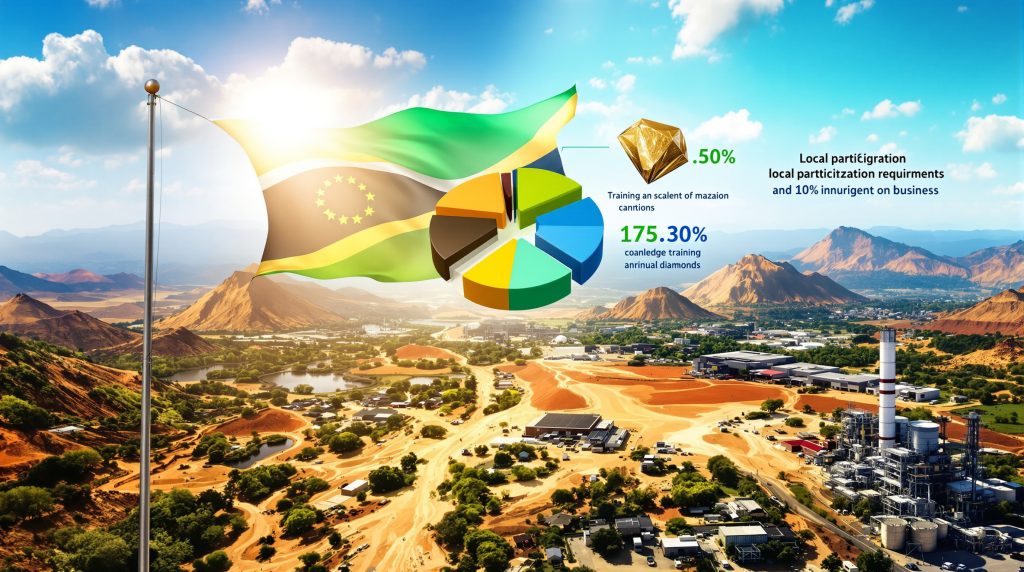What Are Tanzania's Local Content Regulations in Mining?
Tanzania's local content regulations represent a strategic framework designed to maximize domestic participation in the mining sector. These regulations aim to create economic opportunities for Tanzanian citizens and businesses by ensuring they benefit directly from the country's mineral wealth through mandated participation in mining operations, supply chains, and service provision.
The regulatory framework prioritizes indigenous Tanzanian companies and requires foreign entities to form joint venture insights, creating a structured pathway for technology transfer, skills development, and economic empowerment of Tanzanian stakeholders.
These regulations form part of a broader economic development strategy aimed at ensuring Tanzania retains more value from its natural resources. According to government data, the mining sector contributes approximately 6.7% to Tanzania's GDP, with potential for significant growth through increased local participation.
How Have Tanzania's Mining Local Content Regulations Evolved?
Origins and Initial Implementation
Tanzania's journey toward comprehensive local content requirements began with the Mining Act of 2010, which introduced preliminary provisions for local participation. However, the watershed moment came in 2017 with the significant mining sector reforms that fundamentally restructured the industry's regulatory landscape.
The Mining (Local Content) Regulations of 2018 established the first comprehensive framework specifically addressing local participation requirements. These initial regulations set the foundation for indigenous Tanzanian involvement across various aspects of mining operations.
During this initial implementation phase, mining companies were required to develop and submit local content plans, though compliance mechanisms were still evolving and enforcement remained relatively flexible.
Key Amendments Through the Years
The regulatory framework has undergone several strategic refinements:
- 2019 Amendments: Introduced clarifications on reporting requirements and strengthened compliance mechanisms
- 2023 Revisions: Enhanced definitions of indigenous Tanzanian companies and expanded employment quotas
- 2025 Amendments: Implemented stricter joint venture requirements and approval processes
Each amendment has progressively tightened compliance expectations while providing greater clarity on implementation requirements, demonstrating Tanzania's commitment to increasing local economic benefits from its mineral resources.
The 2025 Amendments, published on September 12, 2025, via Government Notice No. 563/2025, represent the most significant strengthening of the regulatory framework to date, with particular focus on joint venture requirements and financial services provisions.
What Are the Core Requirements for Mining Companies?
Joint Venture Structure Requirements
The 2025 amendments have significantly strengthened joint venture requirements for non-indigenous companies seeking to supply goods or services to Tanzania's mining sector:
- Foreign companies must partner with 100% Tanzanian-owned businesses operating in the same field
- Indigenous partners must hold a minimum 20% equity stake in the joint venture
- Joint venture agreements must receive explicit approval from the Mining Commission before operations can commence
These requirements create structured pathways for technology transfer and knowledge sharing while ensuring meaningful Tanzanian participation in mining-related business activities.
The revised framework has removed references to "joint venture companies," indicating a shift toward more specific partnership structures that maximize local participation and control.
Tanzanian Employment and Skills Development Mandates
The regulations establish progressive targets for employing Tanzanian citizens at all organizational levels:
| Position Level | Minimum Tanzanian Representation |
|---|---|
| Board of Directors | 50% |
| Executive Management | 60% |
| Senior Management | 75% |
| Middle Management | 85% |
| Skilled Positions | 95% |
Additionally, mining companies must implement comprehensive skills transfer programs, including:
- Technical training initiatives
- Mentorship programs
- Educational sponsorships
- Research and development collaborations with Tanzanian institutions
These requirements aim to create a sustainable pipeline of skilled Tanzanian professionals capable of assuming increasingly complex roles within the mining sector.
The employment quotas follow graduated timelines: immediate compliance for readily available skills, 5-year transitions for specialized technical roles, and 10-year transitions for highly specialized positions.
Financial Services and Insurance Requirements
The regulations mandate the use of Tanzanian financial institutions and insurance providers:
- Mining companies must maintain accounts with Tanzanian banks
- Insurance policies must be obtained from Tanzanian insurance companies
- Financial services must be procured from Tanzanian providers where available
The 2025 amendments further clarified the definition of "Tanzanian financial institution" as one registered under the Banking and Financial Institutions Act, providing greater regulatory certainty.
Mining companies must now submit specific banking services sub-plans and procurement sub-plans as part of their local content planning, replacing the previous single financial service sub-plan requirement.
How Are Local Content Plans Developed and Approved?
Required Components of Local Content Plans
Mining companies must submit comprehensive local content plans that include:
- Detailed employment and training plans for Tanzanian citizens
- Procurement strategies prioritizing Tanzanian goods and services
- Research and development initiatives involving Tanzanian institutions
- Technology transfer mechanisms
- Succession planning for transitioning expatriate positions to Tanzanians
The 2025 amendments specifically require two specialized sub-plans:
- Banking services sub-plan
- Procurement sub-plan
These plans must demonstrate concrete strategies for maximizing Tanzanian participation across all aspects of mining operations.
Companies are required to provide detailed timelines for implementation, including quarterly milestones and annual targets for increasing local content percentages across different operational areas.
Approval Process and Timelines
The approval process follows a structured timeline:
- Submission of local content plan to the Mining Commission
- Review by the Local Content Committee
- Feedback and revision requests (if necessary)
- Final approval or rejection
The 2025 amendments introduced a significant procedural improvement by establishing a 50-working-day deemed approval period. If the Commission fails to notify an applicant of its decision within this timeframe, the revised local content plan is automatically approved, providing greater certainty for mining operators.
This deemed approval mechanism addresses previous concerns about indefinite waiting periods that created operational uncertainty for mining companies.
Monitoring and Reporting Requirements
Mining companies must maintain rigorous documentation and reporting:
- Quarterly local content performance reports
- Annual consolidated local content reports
- Specific documentation for procurement activities exceeding US$10,000
- Records of training programs and skills transfer initiatives
These reports enable the Mining Commission to monitor compliance and assess progress toward achieving local content objectives.
The Director of the Mineral Audit and Trading Department has been added as a member of the Local Content Committee, strengthening the monitoring and auditing capability of the regulatory framework.
What Are the Reserved Categories for Tanzanian Companies?
Exclusive Goods and Services Categories
The 2025 amendments introduced a significant new provision requiring the Mining Commission to publish a list of goods and services that can only be provided by 100% Tanzanian-owned companies. This list will be published in:
- The Government Gazette
- The Commission's website
- National media outlets
This provision creates protected market segments exclusively for Tanzanian businesses, fostering the development of domestic industries serving the mining sector.
The reserved categories are expected to focus initially on services with lower technical barriers to entry, such as catering, security, transportation, and certain maintenance services, before potentially expanding to more specialized areas as domestic capacity develops.
Procurement Thresholds and Notification Requirements
The regulations establish specific procurement thresholds requiring notification to the Mining Commission:
- Contracts or purchase orders exceeding US$10,000 must be reported
- Information to be provided includes:
- Description of the scope of work
- Prequalification criteria
- Timeline for submission (minimum seven days)
These requirements ensure transparency in procurement processes and enable the Commission to monitor compliance with local content objectives.
For procurement of reserved category goods and services, companies must demonstrate efforts to identify qualified Tanzanian providers and document any quality, capacity, or availability issues that might necessitate exceptions.
How Is Compliance Enforced?
Monitoring Mechanisms
The Mining Commission employs several mechanisms to monitor compliance:
- Regular audits of local content implementation
- Review of quarterly and annual reports
- Inspection of mining operations and supply chains
- Assessment of skills development programs
- Evaluation of technology transfer initiatives
The Local Content Committee, which now includes the Director of the Mineral Audit and Trading Department, plays a central role in overseeing compliance and recommending enforcement actions when necessary.
Companies must provide access to relevant documentation, facilities, and personnel during compliance audits, with significant penalties for obstruction or misrepresentation.
Penalties for Non-Compliance
The regulations establish a graduated system of penalties for non-compliance:
- Administrative fines (TZS 50 million or 5% of mining proceeds, whichever is greater)
- Suspension or cancellation of contracts
- Prohibition from future bidding opportunities
- Suspension or revocation of mining licenses in severe cases
These penalties create strong incentives for mining companies to prioritize local content requirements in their operational planning and execution.
The regulatory framework also includes provisions for remedial action plans, allowing companies to address non-compliance issues within specified timeframes before more severe penalties are imposed.
What Are the Practical Implications for Mining Investors?
Strategic Planning Considerations
Mining investors must integrate local content requirements into their strategic planning from the earliest stages of project development:
- Identify potential Tanzanian joint venture partners well in advance
- Develop comprehensive training and skills transfer programs
- Establish relationships with Tanzanian financial institutions and insurance providers
- Map domestic supply chains for goods and services
- Budget for potential compliance costs and implementation timelines
Early planning enables investors to align their operational strategies with regulatory requirements, minimizing disruptions and compliance challenges.
Project feasibility studies should now include detailed assessments of local content compliance costs and timelines, as these factors can significantly impact overall project economics and implementation schedules.
Operational Adaptation Strategies
Mining companies can implement several strategies to adapt their operations to local content requirements:
- Establish dedicated local content departments with specialized expertise
- Develop comprehensive supplier development programs to build domestic capacity
- Create accelerated training initiatives for Tanzanian employees
- Implement technology transfer mechanisms through joint ventures
- Establish monitoring systems to track local content performance
These strategies enable mining companies to transform regulatory compliance into operational advantages through enhanced local relationships and supply chain resilience.
Companies that proactively invest in developing local supplier capacity often find they can achieve cost efficiencies and operational improvements while simultaneously meeting regulatory requirements.
Economic Impact Assessment
The economic implications of local content regulations in Tanzanian mining extend beyond compliance costs:
- Potential short-term increases in operational expenses
- Medium-term benefits from enhanced local supply chain reliability
- Long-term advantages through workforce development and community relations
- Reduced political risk through increased local economic participation
- Enhanced social license to operate
Forward-thinking mining companies can leverage these requirements to create sustainable competitive advantages through stronger local integration and stakeholder relationships.
The World Bank estimates that effective local content implementation can increase domestic economic benefits from mining operations by 25-40% through direct and indirect multiplier effects.
How Do Tanzania's Regulations Compare Regionally?
Comparison with Other African Mining Jurisdictions
Tanzania's local content regulations represent one of the most comprehensive frameworks in Africa, though several other jurisdictions have implemented similar approaches:
| Country | Key Local Content Features | Comparative Stringency |
|---|---|---|
| Ghana | 10-15% minimum local equity; employment quotas | Moderate |
| South Africa | Broad-Based Black Economic Empowerment requirements | High (different focus) |
| Zambia | Local procurement preferences; limited equity requirements | Lower |
| Nigeria (oil & gas) | Strict local content requirements; supplier development | High |
| Tanzania | 20% minimum equity; comprehensive participation requirements | Very High |
Tanzania's approach is distinguished by its comprehensive scope, covering equity participation, employment, procurement, financial services, and skills development within a single regulatory framework.
While Ghana focuses more on procurement and skills development with less stringent equity requirements, South Africa's framework emphasizes racial transformation through the B-BBEE program rather than purely national ownership.
Regional Harmonization Efforts
Several regional initiatives are working toward harmonizing local content approaches:
- The African Union's African Mining Vision
- The East African Community's regional mining policy
- The Southern African Development Community's mining protocol
These efforts aim to create more predictable regulatory environments while maintaining the economic development objectives that underpin local content requirements.
Regional harmonization could potentially reduce compliance complexity for mining companies operating across multiple African jurisdictions, though significant differences in national priorities and implementation approaches remain challenges.
What Are the Future Trends in Tanzanian Mining Regulations?
Emerging Policy Directions
Several trends are likely to shape the future evolution of Tanzania's local content regulations:
- Increased focus on value addition and beneficiation opportunities
- Greater emphasis on research and development collaborations
- Expanded requirements for environmental management participation
- Enhanced focus on community development initiatives
- Integration of digital technology transfer requirements
These emerging policy directions reflect Tanzania's broader economic development objectives and desire to maximize the domestic benefits of its mineral resources.
The Tanzania Mining Commission has signaled intentions to expand the scope of reserved categories as domestic capacity develops, potentially including more technical services and manufactured inputs over time.
Stakeholder Engagement and Regulatory Development
The regulatory development process is increasingly characterized by structured stakeholder engagement:
- Industry consultations on proposed amendments
- Public-private dialogue mechanisms
- International best practice benchmarking
- Impact assessment studies
- Phased implementation approaches
This collaborative approach aims to balance regulatory objectives with practical implementation considerations, creating a more sustainable framework for local content development.
The establishment of the Tanzania Extractive Industries Transparency Initiative (TEITI) has also enhanced stakeholder engagement and information sharing, providing a platform for ongoing dialogue about local content implementation challenges and successes.
FAQ About Tanzania's Mining Local Content Regulations
What defines an "indigenous Tanzanian company" under the regulations?
An indigenous Tanzanian company must meet several criteria:
- Incorporated under Tanzania's Companies Act
- At least 51% of equity owned by Tanzanian citizens
- At least 80% of executive positions held by Tanzanians
- At least 100% of non-managerial positions held by Tanzanians
- Headquarters located in Tanzania
These requirements ensure that companies qualifying for preferential treatment have substantial Tanzanian ownership and management.
For companies seeking to provide goods and services in reserved categories, an even stricter requirement of 100% Tanzanian ownership applies under the 2025 amendments.
How quickly must mining companies achieve the employment quotas?
The regulations establish a graduated timeline:
- Immediate compliance for readily available skills
- 5-year transition period for specialized technical roles
- 10-year transition period for highly specialized positions
Companies must submit detailed succession plans showing how expatriate positions will transition to Tanzanians over these timeframes.
These timelines recognize the practical challenges of skills development while maintaining pressure for progressive localization of the mining workforce.
Can exceptions be granted to the local content requirements?
The Mining Commission may grant limited exceptions when:
- Required goods or services are unavailable in Tanzania
- Available Tanzanian goods or services do not meet required quality standards
- Available Tanzanian goods or services are priced more than 10% above international alternatives
These exceptions require detailed documentation and explicit approval from the Commission.
The burden of proof lies with the mining company to demonstrate that reasonable efforts have been made to identify and develop local suppliers before seeking exceptions.
How do the regulations affect existing mining operations?
Existing operations must:
- Submit updated local content plans reflecting the new requirements
- Progressively align their operations with current regulations
- Meet transition timelines established by the Mining Commission
While some grandfathering provisions exist, all mining operations are expected to achieve full compliance within established timeframes.
The 2025 amendments specifically require that even contractors or subcontractors already operating in Tanzania must regularize their arrangements and submit their mining claims framework for approval, indicating the retroactive nature of certain compliance requirements.
Further Resources for Mining Stakeholders
Mining stakeholders seeking to navigate Tanzania's local content regulations can access additional guidance through:
- The Tanzania Mining Commission's local content guidance documents
- Industry association compliance workshops and toolkits
- Specialized legal and consulting services focused on mining compliance
- Regional mining forums that address regulatory harmonization efforts
These resources can provide practical implementation strategies and best practice examples from companies that have successfully navigated the regulatory environment.
Understanding and effectively implementing local content requirements is increasingly becoming a key competitive advantage for mining companies operating in Tanzania, as it enhances community relations, reduces political risk, and creates more resilient operational models built on industry evolution insights and critical minerals framework.
Want to Identify Significant Mineral Discoveries Before the Market?
Discovery Alert's proprietary Discovery IQ model delivers instant notifications of major ASX mineral discoveries, giving you a critical edge in both Tanzanian and Australian markets. Explore our discoveries page to understand how early identification of significant mineral finds can transform your investment portfolio.




